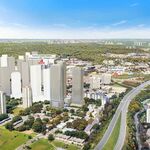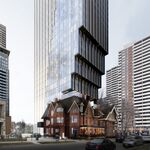Ladies Mile
Active Member
I went to Providence RI for a business conference and to visit a client afterward. I did not, for reasons unclear, remember or even think to take a camera as I had no knowledge of the place and was unsure how long I'd be staying (wound up staying an extra day). I apologize for this oversight, as I would dearly have loved to have supported this post with some pictures.
I decide to post here rather than in the ROW forum because walking around Providence seemed to immediately cast Toronto in a new and very interesting light.
1. Providence is a place that barely exists even on the American radar let alone internationally, yet it immediately struck me a place with a deep and very profound mythos about itself. This mythos was remarkable in part for being grounded to a large degree in the grotesque (The Farelly Brothers), the self-satirizing (The Family Guy) and the actually sinister (H. P. Lovecraft), although there was a fierce and rather wintry element of genuine pride as well. We tend to worry a great deal in Toronto about identity issues and compare our development of the "Toronto brand" with New York, a much larger and more powerful city. Providence is far smaller than Toronto and has the highest unemployment in the northeast yet there was not one moment where I felt that I was looking at anytown USA. Nor, despite the existence of a handful of skyscrapers, did I feel that anyone in Providence cared about being compared to New York (or anywhere else) or thought they ever should be.
2. Providence is far more multicultural than the average American city of its size and is probably the most multicultural city on the Eastern seaboard, after New York, Philadelphia and Miami. How or why this happened I'm unsure, but it did--there are long-standing Portuguese, Latin American, Italian and other ethnic neighbourhoods, many dating to the "great wave" that affected New York in the 1880s and afterward. As above, you are aware of the historic import and character of these districts.
3. I was taken with the crankiness of the built environment. While there were plenty of buildings that repelled me, there were few that were boring or dull: from the austere colonial houses of College Hill (almost Miesian in their purity of form and elegance) to the sometimes sophisticated, rather perverse architecture of downtown, Providence is a catalogue of architecture up against the cutting edge of its own time and culture. Spared much of urban renewal, the place is perhaps no more fascinating than Hartford, CT, would have been otherwise, but by the flabby-minded standards of New York City, the pre-war building stock was far more challenging and programmatic.
4. Providence is a city of landmarks capping hills. No other city in North America--not even Washington DC or Quebec--positions major buildings with the same force. You may or may not care for First Baptist, the Providence Savings Tower, the Rhode Island State Capitol, the First Church of Christ Scientist, the Providence Power Plant (my favourite building--absolutely jaw-dropping and a curative to the idea that functioning industries need be ugly or a detriment to the landscape) and several others, but their place as markers of the city past and present cannot be denied.
5. Providence uncovered its river and is in the process of re-routing its scarring freeway. Until someone can convince me that Providence is richer than Toronto, the idea that similar projects at home simply "won't work" seems pretty much put to the lie by this.
6. I also appreciated the way in which Brown University and the Rhode Island School of Design flow effortlessly in and out of the city. I think we are only beginning to see the University in Toronto as a general addition to the urban landscape: in Providence, Brown and RISD are major features of day to day life (the latter has the city's art museum, which is a stunning collection, the 20th largest in North America).
Which isn't to say that the place is perfect. There are plenty of vacant lots and car-parks, the Victorian era produced its share of monumental horrors, good Modernism is limited to one or two university and civic buildings, there are social and class divisions that seem hard-edged even by the standards of America, the unemployment is noticeable and will probably grow worse. The place is very profoundly a Gothic environment--twilit, mysterious,full of sudden shadows and strange staircases, the perfect setting for the Resnais film of the same name. Yet if I were to suggest a place in the States that would be inspiring to Torontonians for more than negative reasons, I might point to Providence as an unexpected and profoundly disturbing alternate world.
I decide to post here rather than in the ROW forum because walking around Providence seemed to immediately cast Toronto in a new and very interesting light.
1. Providence is a place that barely exists even on the American radar let alone internationally, yet it immediately struck me a place with a deep and very profound mythos about itself. This mythos was remarkable in part for being grounded to a large degree in the grotesque (The Farelly Brothers), the self-satirizing (The Family Guy) and the actually sinister (H. P. Lovecraft), although there was a fierce and rather wintry element of genuine pride as well. We tend to worry a great deal in Toronto about identity issues and compare our development of the "Toronto brand" with New York, a much larger and more powerful city. Providence is far smaller than Toronto and has the highest unemployment in the northeast yet there was not one moment where I felt that I was looking at anytown USA. Nor, despite the existence of a handful of skyscrapers, did I feel that anyone in Providence cared about being compared to New York (or anywhere else) or thought they ever should be.
2. Providence is far more multicultural than the average American city of its size and is probably the most multicultural city on the Eastern seaboard, after New York, Philadelphia and Miami. How or why this happened I'm unsure, but it did--there are long-standing Portuguese, Latin American, Italian and other ethnic neighbourhoods, many dating to the "great wave" that affected New York in the 1880s and afterward. As above, you are aware of the historic import and character of these districts.
3. I was taken with the crankiness of the built environment. While there were plenty of buildings that repelled me, there were few that were boring or dull: from the austere colonial houses of College Hill (almost Miesian in their purity of form and elegance) to the sometimes sophisticated, rather perverse architecture of downtown, Providence is a catalogue of architecture up against the cutting edge of its own time and culture. Spared much of urban renewal, the place is perhaps no more fascinating than Hartford, CT, would have been otherwise, but by the flabby-minded standards of New York City, the pre-war building stock was far more challenging and programmatic.
4. Providence is a city of landmarks capping hills. No other city in North America--not even Washington DC or Quebec--positions major buildings with the same force. You may or may not care for First Baptist, the Providence Savings Tower, the Rhode Island State Capitol, the First Church of Christ Scientist, the Providence Power Plant (my favourite building--absolutely jaw-dropping and a curative to the idea that functioning industries need be ugly or a detriment to the landscape) and several others, but their place as markers of the city past and present cannot be denied.
5. Providence uncovered its river and is in the process of re-routing its scarring freeway. Until someone can convince me that Providence is richer than Toronto, the idea that similar projects at home simply "won't work" seems pretty much put to the lie by this.
6. I also appreciated the way in which Brown University and the Rhode Island School of Design flow effortlessly in and out of the city. I think we are only beginning to see the University in Toronto as a general addition to the urban landscape: in Providence, Brown and RISD are major features of day to day life (the latter has the city's art museum, which is a stunning collection, the 20th largest in North America).
Which isn't to say that the place is perfect. There are plenty of vacant lots and car-parks, the Victorian era produced its share of monumental horrors, good Modernism is limited to one or two university and civic buildings, there are social and class divisions that seem hard-edged even by the standards of America, the unemployment is noticeable and will probably grow worse. The place is very profoundly a Gothic environment--twilit, mysterious,full of sudden shadows and strange staircases, the perfect setting for the Resnais film of the same name. Yet if I were to suggest a place in the States that would be inspiring to Torontonians for more than negative reasons, I might point to Providence as an unexpected and profoundly disturbing alternate world.











